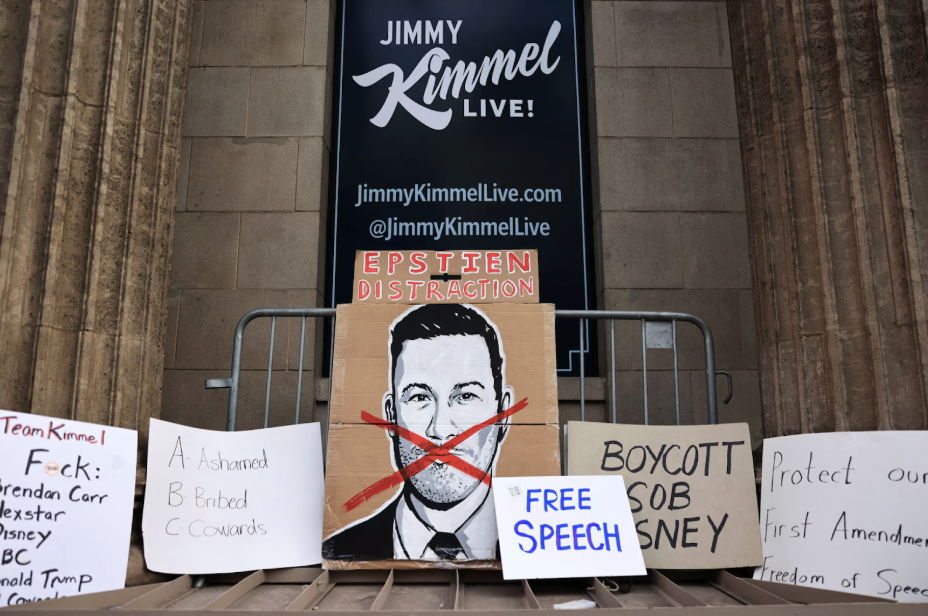Due to Jimmy Kimmel’s comments about Trump and the Make America Great Again (MAGA) supporters’ response to conservative influencer Charlie Kirk’s death, the Jimmy Kimmel Live show was suspended on Sept. 17. Consequently, the suspension was met with significant criticism and sparked nationwide debate about free speech, prompting the show to return to air on Sept. 23.
“It was surprising to see Jimmy’s late-night show get actually suspended, since those talk show programs usually get away with saying a lot,” Katie Hong (10), a frequent late-night talk show viewer, said. “I did not expect the company to step in that quickly and suspend it, considering that the Jimmy Kimmel Live show often makes a lot of satirical and comedic comments.”
Hosted by comedian Jimmy Kimmel, the live show is known for its mix of sharp political commentary, celebrity interviews, and comedic speeches. As one of the most popular American late-night talk shows, it typically draws an average of 1.42 million viewers per episode. During his evening monologue on Sept. 15, Jimmy Kimmel condemned MAGA supporters for distancing themselves from the murderer of Charlie Kirk and using this incident for political advantage, saying, “We hit some new lows over the weekend with the MAGA gang trying to characterize this kid who killed Charlie Kirk as anything other than one of them and doing everything they can to score political points from it.”
Kimmel also satirized Trump’s interview in which he discussed his mourning over Charlie Kirk’s death but quickly shifted the topic to the construction of the White House ballroom, comparing the response to “how a four-year-old mourns a goldfish.”
The remarks quickly drew mixed opinions. The TV show station operator described Kimmel’s comments as “offensive and insensitive at a critical time in our national political discourse,” reflecting concerns from other viewers and some right-leaning political analysts who found it disrespectful and potentially misleading to the public. In contrast, other audiences, such as civil rights advocates, defended Kimmel, seeing his comments as a legitimate satire and a protected form of political expression, not the tragedy of Charlie Kirk’s death itself.
Amid the controversy, ABC announced two days after Jimmy Kimmel’s controversial monologue that it would remove the show indefinitely. This abrupt decision came hours after the chairman of the Federal Communications Commission (FCC) criticized Jimmy Kimmel’s comments and suggested that the agency may hold ABC accountable for spreading misinformation. The chairman stated that the comment was seen as an intentional effort to mislead the public. After the suspension, Trump celebrated the action and called for other shows to be cancelled, stating, “Congratulations to ABC for finally having the courage to do what had to be done.”
“What that situation shows is that the FCC has been sort of politicized as a tool against free speech that the government officials oppose,” Chris Bracciano, MUN advisor, said. “The FCC is supposed to be a neutral regulating body that makes sure television meets certain standards, but in this case, it was speech that the president did not like, and then the FCC exerted pressure on ABC, implying possible fines or other penalties if they allowed the show to be continued.”
The suspension also triggered widespread criticism and boycotts against Disney, owned by ABC, and its streaming services. This included several entertainment unions and free-speech organizations condemning political pressure on broadcasters. Citizens participated in protests organized by civil-liberties advocacy groups, engaged in free speech rallies, calling for the reinstatement of Jimmy Kimmel Live in defense of free expression.
After days of growing criticism, ABC reversed course and brought back the program on Sept. 23. Opening the night’s broadcast, Jimmy Kimmel acknowledged the controversy his delivery may have produced and addressed that his monologue about Charlie Kirk had targeted the politicization surrounding the killing rather than the killing itself.
“I think banning a late-night show entirely just for one segment risks punishing free speech more than addressing the issue, though reinstating doesn’t excuse the commentary,” Joseph Kang, Public Policy Pioneers Vice President, said. “Holding someone accountable should mean calling out what was wrong and expecting growth or change—not banning them from ever speaking again in a show.”
Ultimately, the suspension and reinstatement of Jimmy Kimmel Live highlighted the tension networks face between accountability and censorship alongside political pressure. This episode reflected the ongoing challenge of defining the boundaries of free speech in the modern media, raising questions about how media can balance free expression and accountability amid political pressure.
“Freedom of speech should always be freedom of speech,” Mr. Bracciano said. “This includes even if we do not like what the other person is saying, and that has to go both ways—either side of the political spectrum.”


